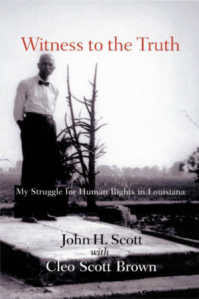Dr. Elsie L. Scott
My father was different from most black fathers in my small hometown in Louisiana. He wore a white shirt and a bow tie every day. He did not eat “greasy” food after 2:00 p.m. because he said his body would not digest it before he went to sleep. He drank herbal teas before they were marketed, and he promoted walking and physical exercise before it became the norm. He read a lot and did not buy us a television because he said it was the “ignorant box.” He talked about civil rights for black people to anyone who would listen.
He did not drink, smoke, dance, go to clubs, curse, gamble or even play cards. Yet, he was well respected in our hometown to the point that when he walked down Levee Street (the block where the nightclubs were located), even the winos straightened up and hid their bottles as they spoke to Rev. Scott.
With a “saint” as a father, it was not easy growing up. All the boys were afraid to try to “court” me because they were afraid of my Daddy. When I went to parties and started dancing, I would hear people saying, “I didn’t know Rev. Scott let her dance”. Other children would be surprised to know that I knew all the words to the top ten hits. One girl told me that she thought that all we did was sit around the house and read the Bible.
Beyond my father’s religious “sainthood”, he was the Moses of the civil rights movement in our section of the state. He was not afraid to speak out for the rights of black people. He refused to back down even when he was harassed, his family threatened, crosses burned near his house, his office burned down and he was shot.
At the time I was growing up, my father’s activism and its negative impact on our lives was not appreciated by me. I longed for normalcy–whatever that was. I knew I wanted to be able to sleep at night without worrying about someone bombing our house. I knew that I wanted a life where I did not have to jump every time the dogs started barking. I did not want to answer any more threatening phone calls. I blamed my father for staying in Louisiana and subjecting us to all of these things. I once told my father that I did not know why he married and had a family because we were all suffering for his fight. I had to go to college before I could truly appreciate why it had to be my family that made the big sacrifice.
Beyond Daddy’s civil rights involvement, he was always helping others. We developed a spirit of service from observing Daddy. From the time we were very young, I remember my father taking us to visit the sick and the people in nursing homes. I remember him taking us to the parish prison farm to visit people there. Even though I did not like the smell of the nursing homes, I felt good going to visit (We also went without our parents) the seniors because for some, this was the highlight of their week. I developed my zeal for justice from watching my Daddy advocate for those who had been unjustly incarcerated. My father never went to law school, but he studied law books so he could provide legal advice to those who did not have the money to hire a lawyer (or who did not trust the advice they were receiving from the white lawyers).
My father taught us sharing. I remember my father coming to my closet asking me to take some of my clothes and give to a family that had lost everything in a fire. He and my mother taught us to be kind to everybody regardless of their station in life, so we were always sharing even though we did not have a lot.
Daddy taught me the lesson of not letting others control you through finances. He paid for everything with cash because he knew credit could be used by the white people to control him. He did not want to have anything that would compromise his ability to lead and his involvement in securing rights for black people. As a result, we never had a new car, but our family had no debt.
I grew up to embrace some of the values instilled in me through the teachings of my parents, but most of all through the examples they set. Of course I never embraced Daddy’s social values of not dancing and social drinking, but I did adopt his health and fitness values, and the spiritual and service values will always be with me.
My father liked to talk politics and enjoyed a spirited debate about politicians and issues. He would probably OD on all the political shows that are now on television. I inherited my interest in politics from him. I remember arguing with him about integration–that he had fought for–and Black Power–that I had embraced. Despite our different world views about the way we could achieve equality, he respected my opinions. When my brother was arrested and expelled from college for “inciting” students to riots again conditions at his college, Daddy was his biggest supporter. He fell out with some of his political friends who refused to stop the unfair prosecution of my brother.
It was not easy growing up the daughter of Rev. Scott, but I survived and I am a better person for all that I learned from him.
